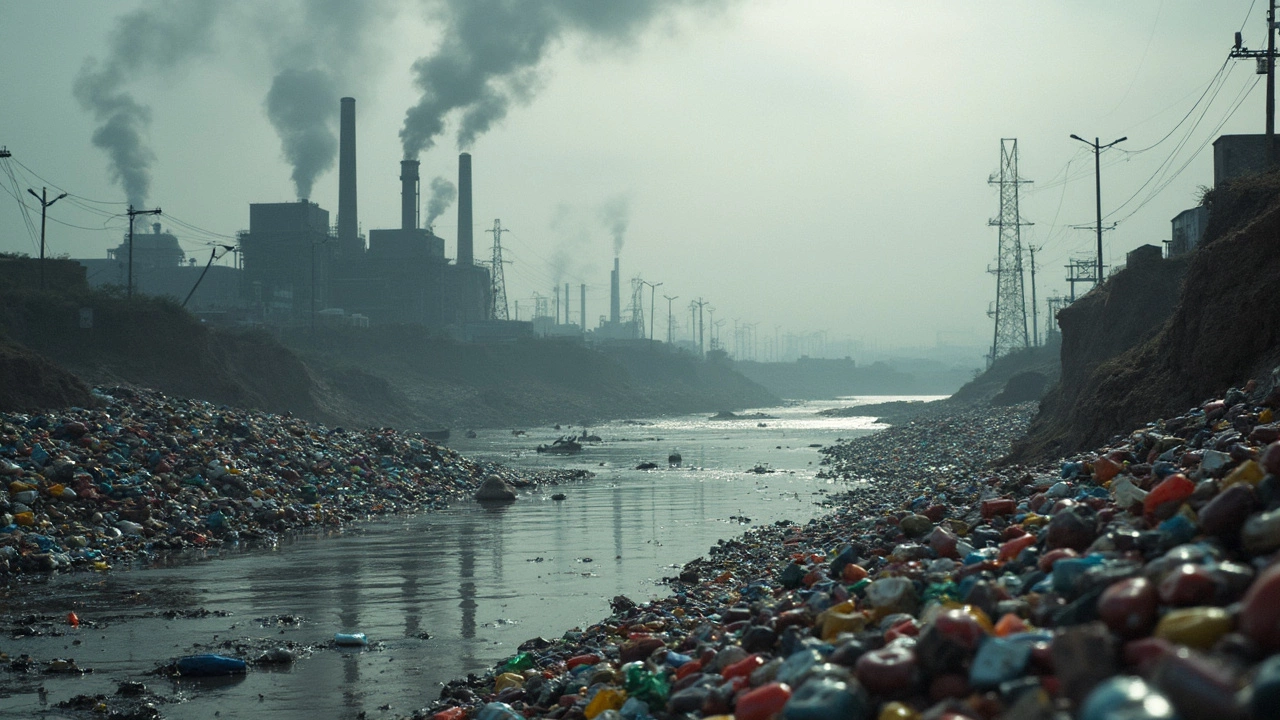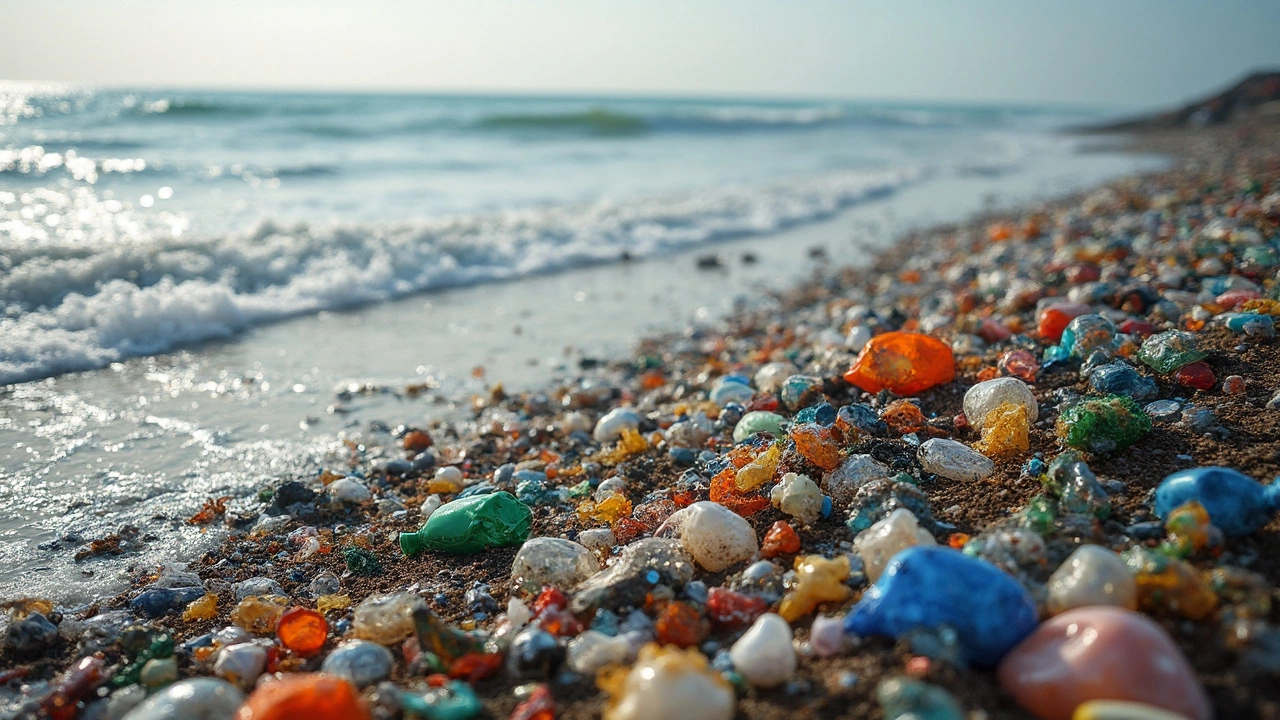
Ever wonder who's still treating our oceans like a trash can? Well, believe it or not, some plastic manufacturing companies are still up to these dirty tricks. You'd think in today's world, there'd be more focus on being eco-friendly, but not everyone got the memo.
The repetitive culprits are often the big names in the plastic industry that can't shake their old habits. It's not just about profit margins; sometimes it’s the lack of proper waste management infrastructure that leads them to dump waste into the blue. What’s even crazier is that many of these companies operate in regions where regulations are lax or poorly enforced — loopholes galore!
Now, think about all that plastic making its way into the oceans: it’s pretty horrifying. Turtles munching on plastic bags, seabirds tangled in waste — it’s like a scene out of a post-apocalyptic movie. But this isn’t fiction; it’s our reality, and it’s devastating marine life.
The Repeat Offenders
Let's talk about the usual suspects when it comes to ocean pollution: the big players in the plastic manufacturing industry. Companies like ExxonMobil and Dow Chemical have been standing in the spotlight for more than just their production numbers. It's no secret they've had their fair share of environmental violations.
Despite increasing pressure, these giants still contribute significantly to the plastic that ends up in our oceans. Why? Because, frankly, it's cheaper to sidestep proper waste management than to fully invest in sustainable practices. Some companies even set up operations in countries where environmental regulations are easy to dodge or simply don’t exist. They might claim they're working on it, but the ocean statistics say otherwise.
Let's check some numbers. Did you know that about eight million metric tons of plastic end up in the ocean each year? Companies based in nations with weak environmental laws are major culprits, masking their dirty deeds under the guise of legal loopholes.
| Company | Annual Plastic Production (Metric Tons) |
|---|---|
| ExxonMobil | 6,000,000 |
| Dow Chemical | 5,500,000 |
It's frustrating, but some of these companies take advantage of inefficiencies in local waste management systems. They might argue that they’re not directly dumping waste into the ocean. Instead, they're using flawed disposal systems that inevitably lead waste to the seas. It's a sneaky tactic that keeps them looking clean on paper.
But here's the kicker: consumer awareness is growing. People are starting to hold these manufacturers accountable by choosing products from companies with better environmental records. As consumers demand more eco-friendly products, the hope is that these words will turn into action, pushing these giants to change their ways. After all, it's the customers who can apply real pressure.
Impact on Marine Life
Let’s dive into the havoc ocean pollution causes to marine life. It’s not a pretty sight. Imagine a big, healthy sea turtle - strong swimmer, right? Now, let’s toss a plastic bag into the mix, maybe one that used to hold your sandwich. To the turtle, this bag looks like a jellyfish, aka a tasty snack. What happens next can be fatal. It’s not rare; it’s happening all too often.
Seabirds are in on the chaos too. They swoop down, thinking they've found themselves a feast, only to gobble up bits of plastic waste. The mess ends in their stomach, and sadly, for many, that’s game over.
It’s alarming, but it doesn’t stop there. Let’s talk numbers for a sec: around 100,000 marine creatures die every year because of plastic waste. Imagine the impact on species' populations and the whole marine food chain. It’s a downward spiral if left unchecked.
This waste even breaks down into tiny particles called microplastics. Don’t let the small size fool you; they’re a big deal. Fish mistake them for food, and guess what? They end up on our plates too. Not cool, right? Real talk – it’s a bigger issue than you might think.
Here’s a glimpse into how plastic breaks down in the ocean:
| Plastic Type | Decomposition Time |
|---|---|
| Plastic Bag | 10-20 years |
| Plastic Straw | 200 years |
| Plastic Bottle | 450 years |
Our poor marine buddies are struggling, but there’s a silver lining. Some countries and companies are stepping up, pushing for stricter regulations and better recycling systems. It’s a team effort to tackle the problem. Each bit of progress makes a difference. So, next time you sip out of a plastic straw or grab a plastic bag, remember the ocean and its inhabitants – they’d thank you for opting for alternatives!

Laws and Loopholes
When it comes to dumping garbage in the ocean, you might wonder, aren't there any laws against this? Well, you're right; there are. International agreements like the MARPOL Convention are in place to reduce pollution in the sea. But here's the kicker: not every country has the same ability or willingness to enforce these rules. Even if the rules are crystal clear, enforcement is often murkier than ocean waters.
One major problem is loopholes. Companies might operate in countries where regulations are lax or not strictly enforced. It's like being on a playground with no adult supervision. Sadly, these places become hotspots for illegal disposal techniques.
Plastic waste that's supposed to be safely processed can end up conveniently tossed because of 'flexible' interpretations of waste management laws. It's almost like some companies have map guides to where they can dump without getting caught. Not cool, right?
And let's not forget the role of offshore dumping. Some businesses use it as a sneaky strategy, exploiting weaknesses in cross-border regulatory frameworks. This sly tactic often escapes reporting, making it a challenge to track and tackle effortlessly.
So, what can make a difference? Well, a combination of stronger regulations, better waste infrastructure, and increased international collaboration could be game changers. But that takes both political will and public pressure to become a reality. Until then, these loopholes remain like unlocked doors, leaving marine life and our oceans at risk.
Taking Action: What We Can Do
So, you're probably wondering how we ordinary folks can tackle the ocean pollution beast, right? Well, it turns out we can make a real difference by tweaking a few of our daily habits and choices. First off, let’s talk about reducing demand. The less demand there is for products from these problematic plastic manufacturers, the less they'll produce and eventually, the less waste there'll be.
Start with cutting down on single-use plastics. You know, the stuff you use once and toss like straws, plastic bags, and bottles. Opt for reusable water bottles and bags, and consider saying no to plastic cutlery. It’s such a small change but imagine the impact if everyone did it!
Next up, recycling. We hear it all the time but recycling right is critical. Make sure to clean and sort recyclables properly; otherwise, they're just going to end up in a landfill or worse, the ocean. Check your local guidelines because rules can vary.
Feeling like playing a bigger role? Get involved in beach clean-ups or support organizations advocating for stronger regulations against ocean dumping. These groups not only organize community efforts but also lobby for better laws and enforcement, closing those pesky loopholes in environmental regulations.
- Support innovation: Invest in or support businesses that evolve in creating sustainable alternatives to plastics. There’s a booming market for biodegradable materials.
- Spread awareness: Share information and educate others about the impact of plastic waste on our marine environment.
- Vote with your dollars: Always consider the environmental record of a company when purchasing products.
If you're a number cruncher, research shows that 70% of worldwide plastic waste is never reused. But by 2030, with widespread sustainable practices, we could potentially reduce that number significantly — and save countless marine species in the process.
By taking these actions, you're not only cutting down on plastic waste but also sending a strong message to companies to clean up their act. Working together, we can push for better policies and create a clean and safe habitat for our marine neighbors.